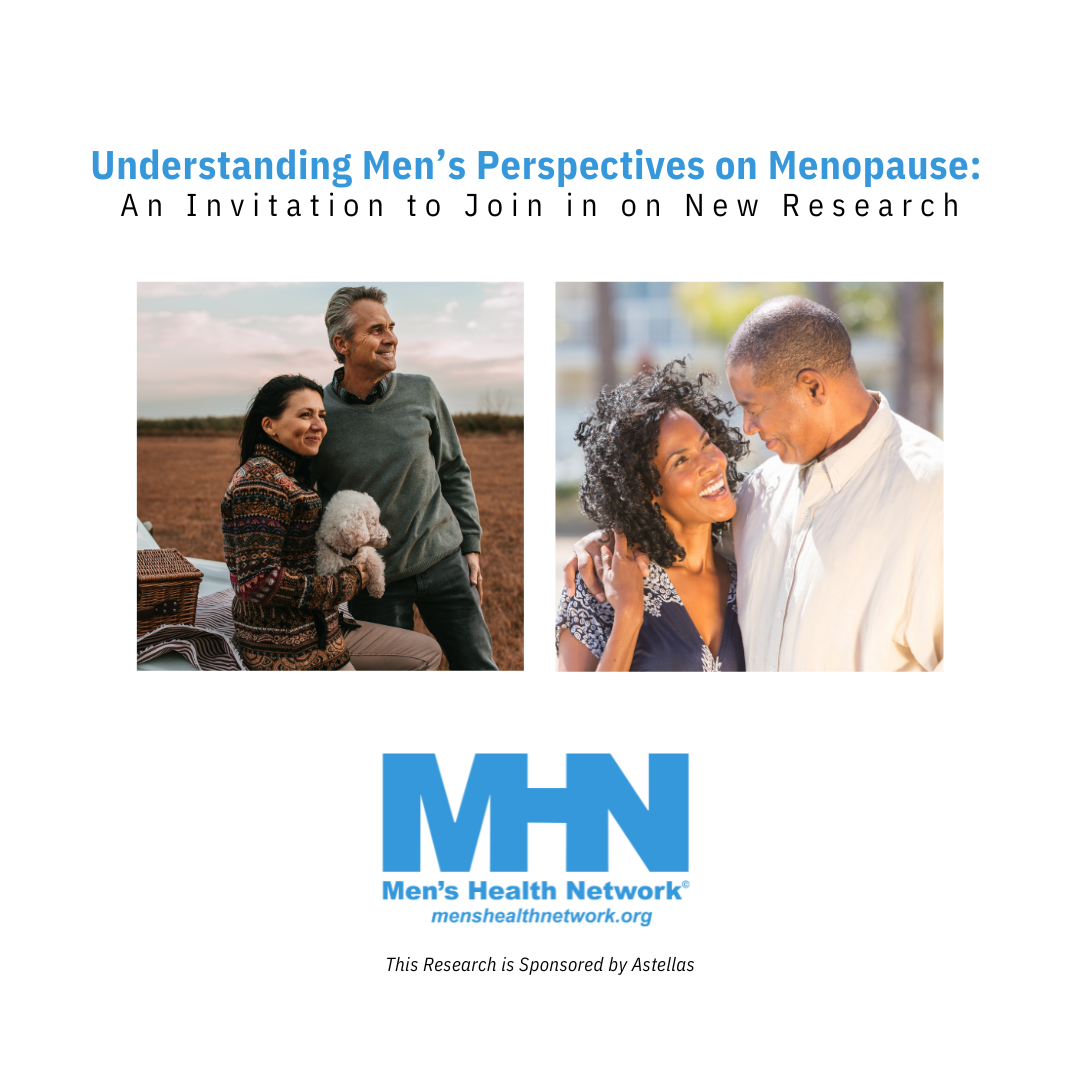Understanding Men’s Perspectives on Menopause:
An Invitation to Join in on New Research
Men’s health is an evolving field, with much progress being made to address both physical and emotional well-being. However, one area that is often overlooked is the impact of menopause on men and their relationships. While menopause is widely recognized as a significant phase in a woman’s life, its effects on partners—especially men—are less discussed. This empathy gap, the difference in understanding and mutual support between men’s and women’s health issues, is the focus of new research being conducted by Men’s Health Network.
This research aims to explore how men experience and understand the menopausal transition of their partners. By focusing on men’s perspectives, this research seeks to uncover insights that will help shape future support systems and educational resources, ensuring that both partners can navigate this life stage with empathy and connection.
The Empathy Gap in Men’s Health
In recent years, much has been done to normalize discussions around women’s health issues such as breast cancer, endometriosis, and menopause.
And this is so important, and needed!
Many women have developed a culture of openness with friends, family, and healthcare providers, discussing sensitive health topics more openly. This culture has been supported by advances in gynecological medicine and increased awareness of women’s specific health needs.
Men’s health, on the other hand, still faces certain stigmas and taboos, particularly around sensitive issues such as low testosterone, sexual dysfunction, or certain cancers (prostate, testicular, etc.). These topics, though critical, are often discussed far less openly, leaving many men feeling uncomfortable or unsupported when it comes to seeking help. This creates a gap in empathy and understanding—what Men’s Health Network refers to as the “empathy gap”—that can leave men feeling isolated or detached, especially when navigating the health issues of their partners.
This empathy gap becomes even more apparent when discussing menopause. While menopause is a widely recognized life stage for women, its emotional and relational impact on men is not often acknowledged. Men may struggle to understand the symptoms their partner is experiencing, or how to provide meaningful support without feeling distanced from the experience. This is where Men’s Health Network hopes to shed light through its new research.
Why This Research Matters
Menopause is more than just a biological process; it can be a significant life change that affects not only the woman experiencing it but also her partner. Men who are in relationships with women going through menopause may feel unsure about how to respond to their partner’s changing needs, emotions, or physical symptoms.
This can create tension, misunderstandings, or feelings of disconnection.
The goal of this research is to give men a platform to share their experiences, thoughts, and perspectives on their partner’s menopausal transition. By collecting and analyzing this data, Men’s Health Network hopes to provide deeper insights into how men can engage with empathy and understanding during this time. It’s not just about “supporting” their partner—it’s about men finding their own connection to the experience, acknowledging their feelings, and understanding how menopause affects their relationship dynamics.
The findings from the research will be used to create educational resources and support systems for men, helping future couples manage menopause in a way that fosters connection rather than confusion or frustration.
Who We’re Looking For
Men’s Health Network is currently seeking participants for this important research.
The qualitative research project will involve in-depth, semi-structured interviews with a diverse sample of men aged 40-65 who have partners experiencing menopausal symptoms.
Each interview will cover a range of topics such as personal experiences and emotional responses to a partner’s menopausal transition and the impact on relationship dynamics and communication, as well as coping strategies and support mechanisms, etc.
How to Participate
If you are interested in participating or have questions about this research, we would love to hear from you.
Send an email with the Subject Line “Men & Menopause.”
Make sure to include your full name, phone number, and your preferred email address to be contacted at:
[email protected]
OR
Visit the website today:
MenopauseResearch.net
Your participation in this research has the potential to shape the future of men’s health by providing much-needed insights into how men experience the menopausal transition of their partners.
Why Your Participation Matters
Menopause is a significant life stage for women, but it also impacts the men in their lives. Understanding how men experience this transition is crucial for developing support systems that work for both partners. Your participation could be the key to creating resources that will benefit couples facing this transition in the future. By sharing your experiences, you will help close the empathy gap and foster a culture where men and women feel equally supported during menopause.
At Men’s Health Network, we believe in the power of empathy and understanding to transform health outcomes. By joining this research, you will not only contribute valuable insights but also help build stronger, more connected relationships during one of life’s most significant transitions.
If you are ready to contribute to this important research, we encourage you to join us in shaping the future of men’s health.
This Research is Sponsored by Astellas.




